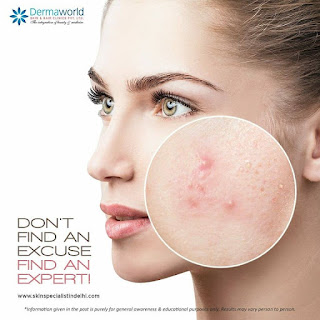Why Consulting with a Dermatologist is Important?
Skin is the reflection of inner health but still, people tend to ignore the warning signs of any health issues that appear on the skin. It’s everybody’s dream to get a long-term flawless, glowing, and young-looking skin appearance. But in today’s time, a poor lifestyle and an improper skincare regimen can result in different skin concerns, shares Dr. Rohit Batra, Best dermatologist in Delhi, at Dermaworld Skin and Hair Clinics.
Who are dermatologists?
A dermatologist is a medical physician that is well-versed, trained, and has expertise in the field concerned with the health of the hair, skin, and nails. They can also examine suspicious skin moles that may become malignant and diagnose skin cancer. Many of them are also trained as pediatric dermatologists to address skin concerns only in children and some may also practice cosmetic in-office procedures to enhance the skin appearance including laser therapy, chemical peeling, microdermabrasion, and others.
What is the need to see a dermatologist?
It’s very common to experience any discomforting and embarrassing skin condition at some point of the lives such as frequent acne breakouts, itchy red rashes, allergies or infections, dryness, and skin discoloration. Dermatologists can assist in the diagnosis and treatment of any such issues. They recommend various treatment options that can be personalized based on the condition and circumstances of the patient.
The best part of visiting a dermatologist is that the patients would not only get the treatment but also a detailed understanding of their condition so that they can take better care of their skin even after the treatment.
Experts recommend an immediate visit to the dermatologist if they have any of the following signs:
- Acne: When the acne blemishes appear more often and stay for a longer duration. This could be due to a hormonal imbalance and may result in thyroid issues.
- Itching: Sometimes, the itching of the skin could be a sign of an underlying body infection or diabetes or an indication of kidney and liver problems.
- Skin dryness: Mild dryness is normal to be seen during the winter season but if it becomes extensive, it could be due to thyroid or diabetes.
- Skin rashes or allergies: These can result in changes in skin appearance and are caused by sunburn or sometimes an allergy to certain medications or viral infections.
- Yellowing of the skin especially around the eyes: These are cholesterol deposits that could mark an abnormal lipid profile.
- Darkening of the skin (especially underarms and neck): This symptom is known as acanthosis nigricans which is usually a sign of insulin resistance leading to diabetes. People often incorrectly think of this as an outcome of accumulated dirt or just allergy.
- Persistent facial redness with or without itching (typically on cheeks and nose): This is one of the symptoms of lupus- an internal disease that mostly affects the liver, kidneys, oral cavity, or joints.
To know more about the treatments provided by Dr. Rohit Batra, please visit at https://www.drrohitbatra.com/.




Comments
Post a Comment